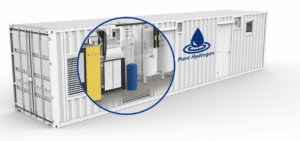Pure Hydrogen makes progress in gas project in Botswana, aims to be a leading hydrogen producer in Africa
Energy
Energy
Pure Hydrogen’s Serowe project in Botswana is set to transform the country’s energy mix, as the company sets its eyes on supplying hydrogen to southern and central Africa.
Clean energy company Pure Hydrogen (ASX:PH2) is about to start drilling two more appraisal wells at its Serowe coalbed methane project in Botswana.
This comes after it carried out a short term flow test of the Serowe-3 well, which intersected 41m of gassy coals – more than double the company’s pre-drill estimates.
The Serowe project has the potential to convert methane to hydrogen through the company’s unique process called pyrolysis.
PH2 says this method is capable of producing turquoise hydrogen from methane at a lower cost than green hydrogen competitors.
Green hydrogen uses renewable energy to power electrolysers that split hydrogen from water.
The company has been targeting the large and growing demand for energy in Botswana, a politically stable country with a population of 2.3 million people.
Botswana wants to reduce its reliance on South Africa for its electricity needs, and develop its own energy resources.
Pure Hydrogen owns a 51% stake in the Serowe CBM project, with partner Botgas holding the remaining 49%.
The project currently hosts a prospective resource of 2.8 trillion cubic feet of gas net to the company within the interpreted high-grade area.
In July, Pure Hydrogen swapped its 21% stake in the Serowe Gas Project for a 19.99% stake in Botsgas, an ASX IPO candidate that will be renamed to Botala Energy.
The two companies established the Serowe Hydrogen Hub, which aims to generate 50MW of electricity for Botswana.
The Hub is one of the largest in Africa, and will be eligible for several financing programs that apply in the country.
The market for green energy in Botswana has been accelerating recently, following the development of the country’s renewable energy strategy alongside the World Bank.
Botswana itself is a stable, socially aware country, and is friendly towards foreign investors.
PH2 says there’s an opportunity to supply hydrogen beyond Botswana and to other surrounding countries, as there are significant truck and rail routes that connect Botswana to southern Africa.
Hydrogen can also be supplied to support the copper belts in central African countries like Zambia and the Congo.
With these opportunities, PH2 and Botala aim to become a significant producer and distributor of hydrogen for heavy haulage in the southern and central African regions.
PH2 had earlier this year partnered with Australian-based Synergen Met to use Synergen’s modular technology to produce hydrogen from natural gas using the pyrolysis process.
The two companies have built a 12m long shipping container-sized module design that can produce 1,500kg of hydrogen and 4,500kg of carbon product per day.
On-site hydrogen generators tap into existing natural gas pipelines or co-located biogas resources to generate hydrogen production at the point of use, eliminating the cost and emissions of transportation.

In Botswana, wood is currently the primary fuel source in 46% of homes, where adults and children spend time gathering wood instead of working or attending school.
This new alternative energy produced by PH2 will not only generate an alternative to domestic biomass fuel sources, it will also reduce air pollution in the country by replacing coal.
In transportation, hydrogen also has many advantages over diesel.
Studies have shown that hydrogen is more efficient, produces less noise, and has a better range than diesel.
Using a hydrogen-powered vehicle also means less maintenance, and for trucks, it leads to a reduced payload compared to diesel engine trucks.
This article was developed in collaboration with Pure Hydrogen, a Stockhead advertiser at the time of publishing.
This article does not constitute financial product advice. You should consider obtaining independent advice before making any financial decisions.